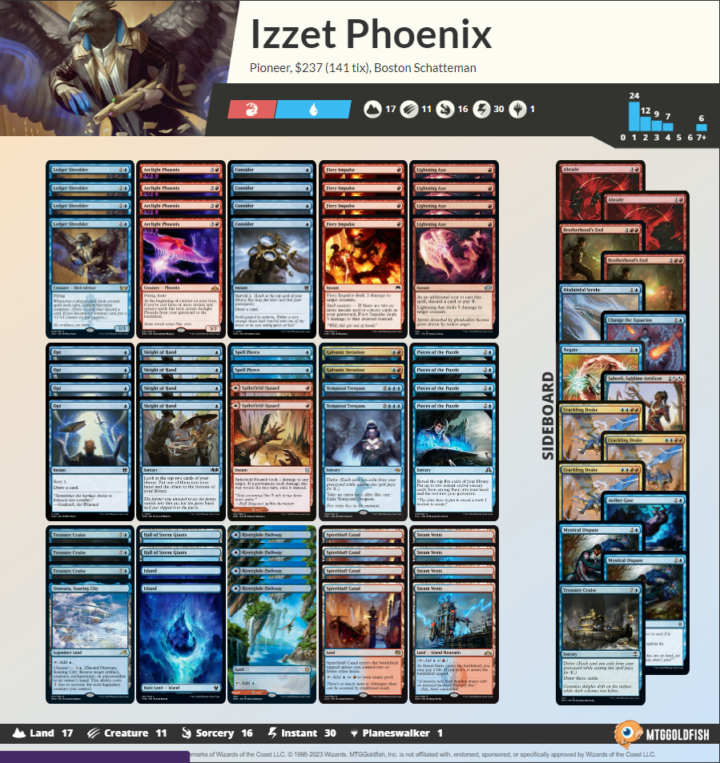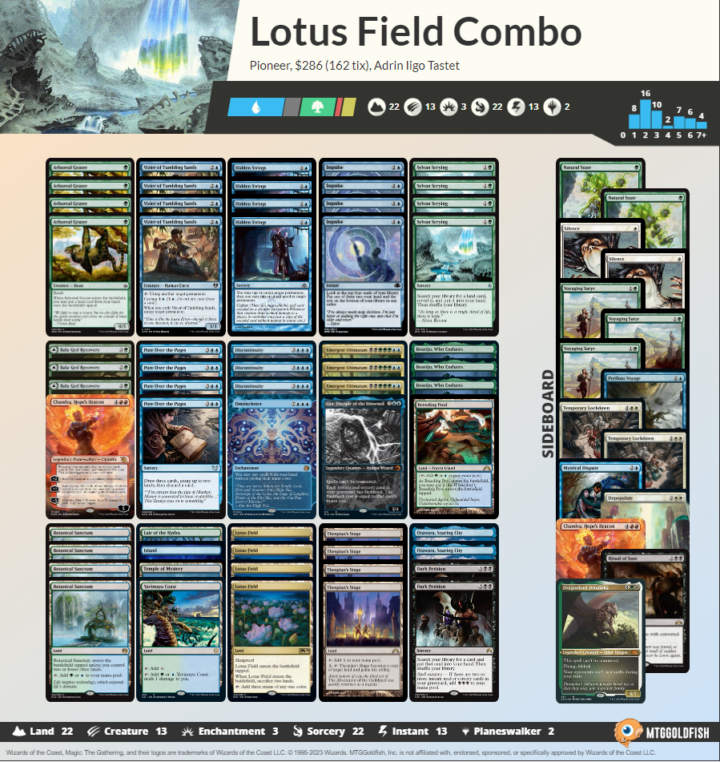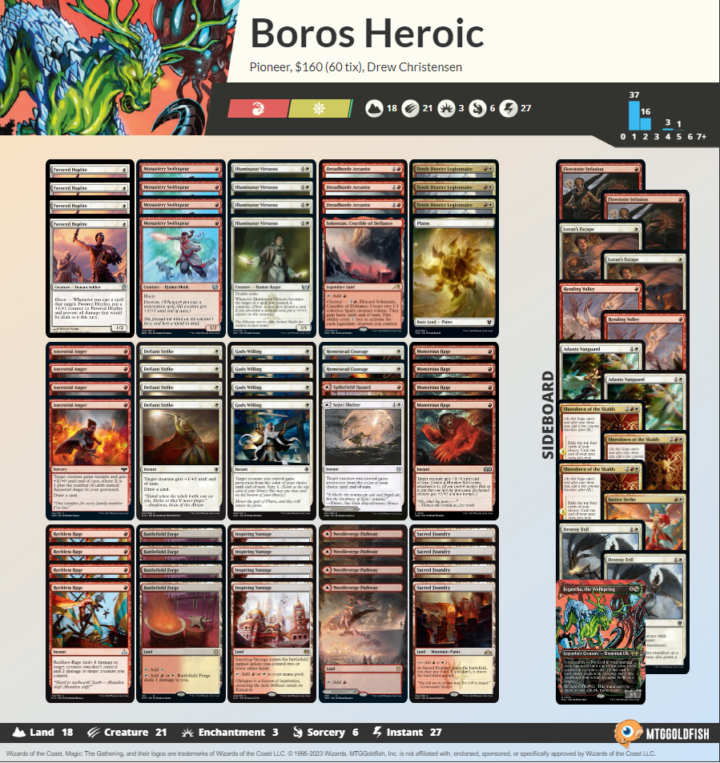All eyes have been on Modern Regional Championship Qualifiers lately, but the first round of Regional Championships playing Pioneer wrapped up this weekend. There were some interesting, key developments worth mentioning, so let’s not beat around the bugs and jump right into exploring them.
Izzet Phoenix
Phoenix won the Canadian RC while also putting up good results in the EU RC. This is a deck that pops up for a bit and then fades away every single RC season.
This cycle keeps happening because the deck is so easy to attack, despite its power. If you want to beat Phoenix you often can. Cards like Go Blank are devastating to the strategy.
So, what changed? Why is Phoenix crushing Pioneer?
Well there are two big reasons. The first is cards like Go Blank are not being played very much. This means Phoenix decks have less natural predators right now.
After all, when this archetype doesn’t go against graveyard hate, it can feel very broken. Casting Treasure Cruise unimpeded is devastating for most opponents, which is before we even get to all the other graveyard synergies.
The other big factor is a new card being added to the deck. Sleight of Hand’s reprint in Wilds of Eldraine and made for a huge upgrade. While having some instant speed cantrips like Opt and Consider is good, Sleight of Hand lets you make a more informed decision and helps with chaining spells in a single turn.
Consider fuels the graveyard, so Surveil is a good alternative if the card on top of your library either isn’t good or is better in the graveyard. But just putting a card on bottom with Opt isn’t really doing much, and it actually makes it much harder to chain spells in a turn the way Phoenix needs to execute its game plan.
Maybe the first card you see off Opt is medium, but the card on top is just a land. Sleight of Hand lets you see both options up front and decide, which is worth the cost of Sorcery speed. The card also has increased the consistency of the deck, allowing players to trim down to more one-and-two-ofs and still find the important pieces, like Temporal Trespass.
If you already have Phoenix, now is a great time to give the deck a little update before jumping back into the format. And if you want to capitalize on the deck’s power, it’s better to make hay while the sun is shining before the winds of the meta shift against it.
Lotus Field Combo
Lotus Field has been a constant pain in players’ side since the format’s introduction. This build is a consistent, hard-to-interact-with combo that looks to generate a ton of mana and loop Chandra, Hope’s Beacon with Bala Ged Recovery in the same turn to burn the opponent out.
The deck involves a fairly convoluted combo-kill, but it is ironically also one of the cleanest options the archetype has ever seen.
This deck also gained a new innovation: Discontinuity. The primary function is actually allowing you to skip very far ahead on mana by casting the spell in response to the sacrifice trigger of Lotus Field.
This gets around sacrificing two lands and makes playing the second copy of Field much easier. As a result, you can often start your combo a turn sooner since you can then Thespian’s Stage, use Lotus Field to cast Hidden Strings, untap your two Lotus Fields and start going a whole turn sooner.
Discontinuity also technically gives you added interaction at a steep cost. But still, the ability to skip your opponent’s turn and give you more set up time to go off and win the game is hard to turn down when you can afford it.
Also when I said hard to interact with earlier, that was both true and also sort of not true. This deck is mostly playing with lands and few creature spells, so your removal options are quite often pretty mediocre against decks that can build up a board.
Additionally, every deck actually does have a silver bullet that is very good against this deck: Damping Sphere. This colorless card really causes a ton of problems for Lotus Field, so it’s one you see the deck’s pilots try to respect post-board.
That said, while many players are typically reluctant to pay the Lotus Field tax, they will change their sideboard up once players see this deck doing well. In many ways, the deck is similar to Phoenix.
As a result, now is typically the best time to play this deck since no one is expecting it. Then again, the fact we are talking about it means it might be time to put your Lotus Fields back down unless you’re just a huge combo gamer. Ultimately, the choice is yours.
Boris Heroic
Boros Heroic has been doing well on Magic Online and even made a Top 8 appearance in the Canadian RC.
This deck was popular just over a year and a half ago as the answer to mono green, which this deck does excel at beating. This strategy is incredibly fast and punishes decks that can’t interact. The real problem it faces, though, is the removal that lines up well against this deck.
All of the black removal spells like Fatal Push, Power Word Kill, etc. all remain common issues, but a newer addition to the sideboard in Loran’s Escape helps to some extent.
At the same time, the tricky damage based removal in the early game (cards like Fiery Impulse) also used to overpower your creatures through one heroic/prowess trigger. But a new tool in the form of Monstrous Rage gives Trample AND a crucial, additional +1/+1.
Both are huge, as chump blockers are often a problem for this deck. Meanwhile, the role giving a passive +1/1 means a single damage based removal spell often actually isn’t enough to kill your creature.
While all these upgrades are good for Heroic and I think it’s a fine deck, my stance on Boros in Pioneer remains the same. If you’re playing this style of deck, you should be changing between Heroic and Convoke. Opponents can adapt to beat either deck, but it’s hard to beat both at the same time with just sideboard cards.
End Step
We may have three decks that take an opportunistic mind to pilot successfully, but Pioneer RC season always sparks innovation and puts the format on its head. I’m excited to see how the meta develops over the coming weeks and we will be examining them all here! Make sure you keep checking back to give yourself the best competitive edge possible.

Mason Clark is a grinder in every corner of the game who has played at the pro level and on the SCG Tour with Team Nova. Whether he’s competing in Standard, Historic or Modern, Mason plays with one goal in mind: to be a better player than he was the day before. Check out his podcast, Constructed Criticism, and catch his streams on Twitch.




